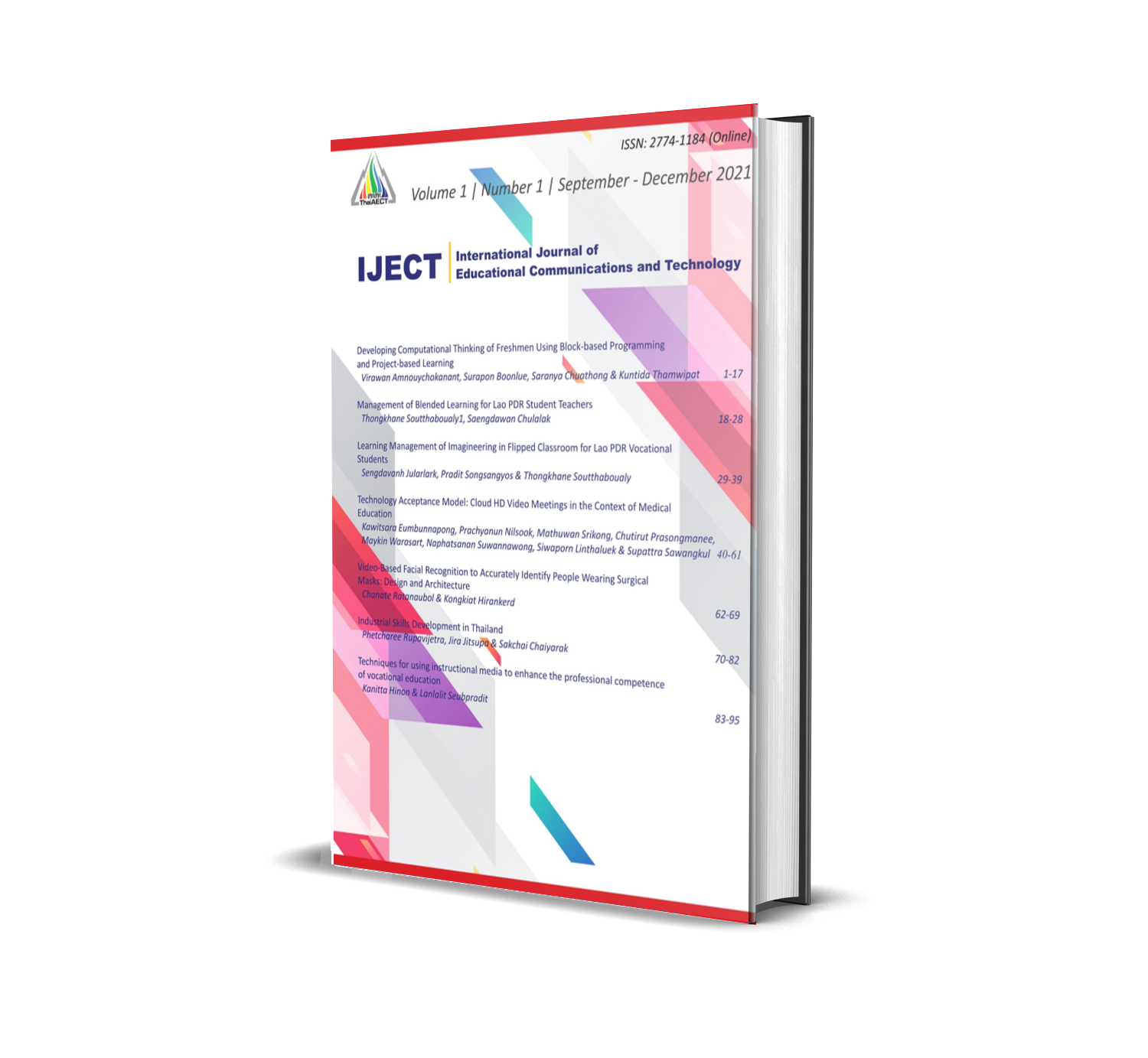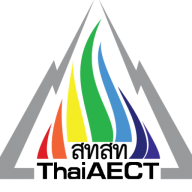Digital Culture Leadership in Elementary Education
Keywords:
Digital Transformation, Digital leadership, Digital Innovation, Digital Culture, Change ManagementAbstract
We have entered an era of digital technology where individuals or organizations are obliged to fully embrace digital technology with ever-increasing change and improvement. Leaders must have skills and capabilities to use digital technology and apply these throughout the organization, to create a continuous improvement strategy that drives every data in their organization to change. This research focusses on developing a conceptual framework of such digital culture leadership for Elementary Education. It is proposed as a model for the attributes of the leaders of educational management in the digital age, encompassing: (1) Digital leadership, (2) Digital culture, (3) Change management, (4) Digital innovation and (5) Digital transformation. The factors within each of these categories are defined as follows; Digital leadership consists of five elements, which are vision, collaboration, management skills, digital literacy and innovation/creativity. Digital culture consists of four elements, which are collaboration, data-driven, customer centric, and innovation. Change management process consists of seven components, which are organizational structure, organization culture, strategy, decision making, process, technology and people. Digital innovation consists of three elements, which are digital application, change management and digital infrastructure. Through the proposed digital transformation processes applied to six organizational elements of strategy, staff, technology, data analytics, process and organizational culture, this research framework can be used as a way to enhance digital culture leadership with a vision for digital transformation. It provides a review methodology for the education administrator's current leadership practices, to suggest holistic improvements to management efficiency.
References
Abad-Segura, E., González-Zamar, M. D., Infante-Moro, J. C., & García, G. R. (2020). Sustainable management of digital transformation in higher education: Global research trends. Sustainability (Switzerland), 12(5). https://doi.org/10.3390/su12052107
Aditya, B. R., Ferdiana, R., & Kusumawardani, S. S. (2021). Categories for barriers to digital transformation in higher education: An analysis based on literature. International Journal of Information and Education Technology, 11(12), 658–664. https://doi.org/10.18178/IJIET.2021.11.12.1578
Agasisti, T., Frattini, F., & Soncin, M. (2020). Digital innovation in times of emergency: Reactions from a school of management in Italy. Sustainability (Switzerland), 12(24), 1–17. https://doi.org/10.3390/su122410312
Agélii Genlott, A., Grönlund, Å., & Viberg, O. (2019). Disseminating digital innovation in school – leading second-order educational change. Education and Information Technologies, 24(5), 3021–3039. https://doi.org/10.1007/s10639-019-09908-0
AlAjmi, M. K. (2022). The impact of digital leadership on teachers’ technology integration during the COVID-19 pandemic in Kuwait. International Journal of Educational Research, 112. https://doi.org/10.1016/j.ijer.2022.101928
AlNuaimi, B. K., Kumar Singh, S., Ren, S., Budhwar, P., & Vorobyev, D. (2022). Mastering digital transformation: The nexus between leadership, agility, and digital strategy. Journal of Business Research, 145, 636–648. https://doi.org/10.1016/j.jbusres.2022.03.038
Alqatawenh, A. S. (2018). Transformational leadership style and its relationship with change management. Business: Theory and Practice, 19, 17–24. https://doi.org/10.3846/btp.2018.03
Appio, F. P., Frattini, F., Petruzzelli, A. M., & Neirotti, P. (2021). Digital Transformation and Innovation Management: A Synthesis of Existing Research and an Agenda for Future Studies. In Journal of Product Innovation Management (Vol. 38, Issue 1, pp. 4–20). Blackwell Publishing Ltd. https://doi.org/10.1111/jpim.12562
Basu, R. (2022). IMPACT OF DIGITAL PLATFORM ON E-LEADERSHIP. In Journal of Positive School Psychology (Vol. 2022, Issue 2). http://journalppw.com
Bygstad, B., Øvrelid, E., Ludvigsen, S., & Dæhlen, M. (2022). From dual digitalization to digital learning space: Exploring the digital transformation of higher education. Computers and Education, 182. https://doi.org/10.1016/j.compedu.2022.104463
Ciriello, R. F., Richter, A., & Schwabe, G. (2018). Digital Innovation. Business and Information Systems Engineering, 60(6), 563–569. https://doi.org/10.1007/s12599-018-0559-8
Cruz, E., Albuquerque Costa, F., Pereira, C., Cruz, E., Costa, F. A., & Pereira, C. (2021). Who cares about the digital culture at school?
Cultri, C. N., & Bazilio, A. P. M. (2021). TECNOLOGIA SOCIAL E CULTURA DIGITAL. 37(2), 2021. https://doi.org/10.15628/holos.2021.9885
de Bem Machado, A., Secinaro, S., Calandra, D., & Lanzalonga, F. (2022). Knowledge management and digital transformation for Industry 4.0: a structured literature review. Knowledge Management Research and Practice. https://doi.org/10.1080/14778238.2021.2015261
Ehlers, U.-D. (2020). Digital Leadership in Higher Education. Journal of Higher Education Policy And Leadership Studies, 1(3), 6–14. https://doi.org/10.29252/johepal.1.3.6
Erofeeva, M. A., Stolyarova, A. N., Terekhova, A. I., Ignatyeva, A. v., Deberdeeva, N. A., Zebnitskaya, A. K., & Leontev, M. G. (2020). Innovative Methods in Management and Raising the Quality of Higher Professional Education in Russia. Propósitos y Representaciones, 8(SPE2). https://doi.org/10.20511/pyr2020.v8nSPE2.653
Fichman, R. G., dos Santos, B. L., & Jindal, N. (2014). DIGITAL INNOVATION AS A FUNDAMENTAL AND POWERFUL CONCEPT IN THE INFORMATION SYSTEMS CURRICULUM 1 Zhiqiang (Eric) Zheng (Vol. 38, Issue 2). http://www.misq.org
Gallastegui, L. M. G., & Forradellas, R. F. R. (2021). Business methodology for the application in university environments of predictive machine learning models based on an ethical taxonomy of the student’s digital twin. Administrative Sciences, 11(4). https://doi.org/10.3390/admsci11040118
Ghavifekr, S., & Wong, S. Y. (2022). Technology leadership in Malaysian schools: The way forward to education 4.0 – ICT utilization and digital transformation. International Journal of Asian Business and Information Management, 13(2). https://doi.org/10.4018/IJABIM.20220701.oa3
Gulden, M., Saltanat, K., Raigul, D., Dauren, T., & Assel, A. (2020). Quality management of higher education: Innovation approach from perspectives of institutionalism. An exploratory literature review. In Cogent Business and Management (Vol. 7, Issue 1). Cogent OA. https://doi.org/10.1080/23311975.2020.1749217
Hemerling, J., Kilmann, J., Danoesastro, M., Stutts, L., & Ahern, C. (2018). IT’S NOT A DIGITAL TRANSFORMATION WITHOUT A DIGITAL CULTURE.
Hinings, B., Gegenhuber, T., & Greenwood, R. (2018). Digital innovation and transformation: An institutional perspective. Information and Organization, 28(1), 52–61. https://doi.org/10.1016/j.infoandorg.2018.02.004
Kähkipuro, P. (2021). A new Digital Innovation Model for Higher Education after the Covid-19 Pandemic.
Kalimullina, O., Tarman, B., & Stepanova, I. (2021). Education in the context of digitalization and culture: Evolution of the teacher’s role, pre-pandemic overview. Journal of Ethnic and Cultural Studies, 8(1), 226–238. https://doi.org/10.29333/ejecs/629
Kaputa, V., Loučanová, E., & Tejerina-Gaite, F. A. (2022). Digital Transformation in Higher Education Institutions as a Driver of Social Oriented Innovations. In Innovation, Technology and Knowledge Management (pp. 61–85). Springer. https://doi.org/10.1007/978-3-030-84044-0_4
Karippur, N. K., & Balaramachandran, P. R. (2022). Antecedents of Effective Digital Leadership of Enterprises in Asia Pacific. In Australasian Journal of Information Systems Karippur & Balaramachandran (Vol. 2022).
Kaur, R. (2018). Change Management: A Big Solution to Cope Up With IT Based Culture in 21st Century Libraries. Library Progress (International), 38(1), 140. https://doi.org/10.5958/2320-317x.2018.00014.4
Kvitka, O. (2020). DIGITAL CULTURE AS A COMPONENT OF GENERAL CULTURAL COMPETENCE OF STUDENTS. http://dislib.ru/pedagogika/8277-4-
Lazăr, E., & Lixandru, I. F. (2020). ANNALS OF THE UNIVERSITY OF CRAIOVA, Psychology-Pedagogy, year XIX, no 41 CHANGE MANAGEMENT-THE APLICATIVE CONTEXT OF THE FACTORS WHICH DECISIVELY INFLUENCE THE QUALITY OF EDUCATIONAL ACT.
Mohamed Hashim, M. A., Tlemsani, I., & Matthews, R. (2021). Higher education strategy in digital transformation. Education and Information Technologies. https://doi.org/10.1007/s10639-021-10739-1
Mohebi, L., & Professor, A. (2019). Educational Leadership and Digital Culture. https://ssrn.com/abstract=3419519
Nambisan, S., Lyytinen, K., Majchrzak, A., & Song, M. (2017). Digital Innovation Management: Reinventing Innovation Management Research in a Digital World. MIS Quarterly, 41(1), 223–238. https://doi.org/10.25300/MISQ/2017/41:1.03
Neumeyer, X., & Liu, M. (2021). Managerial Competencies and Development in the Digital Age. In IEEE Engineering Management Review (Vol. 49, Issue 3, pp. 49–55). Institute of Electrical and Electronics Engineers Inc. https://doi.org/10.1109/EMR.2021.3101950
Ou-Sekou, Y., Kaddari, F., & Zaid, A. (2021). Characterizing the Digital Culture of Prospective Primary School Teachers. In Education Research International (Vol. 2021). Hindawi Limited. https://doi.org/10.1155/2021/9968216
Paniago, M. C. L., Santos, R. M. R. dos, & Dorsa, A. C. (2021). Networks in the context of digital culture: technologies, coordinators, university teachers and students. Interações (Campo Grande), 675–684. https://doi.org/10.20435/inter.v22i3.3259
Pata, K., Tammets, K., Väljataga, T., Kori, K., Laanpere, M., & Rõbtsenkov, R. (2021). The Patterns of School Improvement in Digitally Innovative Schools. Technology, Knowledge and Learning. https://doi.org/10.1007/s10758-021-09514-5
Planes-Satorra, S., & Paunov, C. (2019). The digital innovation policy landscape in 2019. In TECHNOLOGY AND INDUSTRY POLICY PAPERS.
Rof, A., Bikfalvi, A., & Marquès, P. (2020). Digital transformation for business model innovation in higher education: Overcoming the tensions. Sustainability (Switzerland), 12(12). https://doi.org/10.3390/su12124980
Rousseau, D. M., & ten Have, S. (2022). Evidence-based change management. Organizational Dynamics. https://doi.org/10.1016/j.orgdyn.2022.100899
Rüth, R., & Netzer, T. (2020). The key elements of cultural intelligence as a driver for digital leadership success. Leadership, Education, Personality: An Interdisciplinary Journal, 2(1), 3–8. https://doi.org/10.1365/s42681-019-00005-x
Sağbaş, M., & Alp ERDOĞAN, F. (2022). DIGITAL LEADERSHIP: A SYSTEMATIC CONCEPTUAL LITERATURE REVIEW.
Saleem, M. M., Ali, H. S., & Jabir, H. A. (2020). The Reality of Change Management among Schools’ Principals in Misan Governorate from the Perspective of Physical Education Teachers. In Systematic Reviews in Pharmacy (Vol. 11, Issue 12).
Saputra, N., & Saputra, A. M. (2020). Transforming into Digital Organization by Orchestrating Culture, Leadership, and Competence in Digital Context. GATR Global Journal of Business Social Sciences Review, 8(4), 208–216. https://doi.org/10.35609/gjbssr.2020.8.4(2)
Saraih, E. F., Wong, S. L., Asimiran, S., & Khambari, M. N. M. (2022). Contemporary communication conduit among exemplar school principals in Malaysian schools. Research and Practice in Technology Enhanced Learning, 17(1). https://doi.org/10.1186/s41039-022-00179-x
Somadi, N., & Salendu, A. (2022). Mediating Role of Employee Readiness to Change in the Relationship of Change Leadership with Employees’ Affective Commitment to Change. Budapest International Research and Critics Institute-Journal, 5(1), 30–38. https://doi.org/10.33258/birci.v5i1.3576
Tołwińska, B. (2021). The Role of Principals in Learning Schools to Support Teachers’ Use of Digital Technologies. Technology, Knowledge and Learning, 26(4), 917–930. https://doi.org/10.1007/s10758-021-09496-4
Tungpantong, C., Nilsook, P., & Wannapiroon, P. (2021). A Conceptual Framework of Factors for Information Systems Success to Digital Transformation in Higher Education Institutions. 2021 9th International Conference on Information and Education Technology, ICIET 2021, 57–62. https://doi.org/10.1109/ICIET51873.2021.9419596
Ungureanu, A. (2014). MANAGEMENT AND CHANGE IN ROMANIAN EDUCATION. Contemporary Readings in Law and Social Justice, 6(1), 371–377.
van Wart, M., Roman, A., Wang, X. H., & Liu, C. (2019). Operationalizing the definition of e-leadership: identifying the elements of e-leadership. International Review of Administrative Sciences, 85(1), 80–97. https://doi.org/10.1177/0020852316681446
Wiesböck, F., & Hess, T. (2020). Digital innovations: Embedding in organizations. Electronic Markets, 30(1), 75–86. https://doi.org/10.1007/s12525-019-00364-9
Downloads
Published
How to Cite
Issue
Section
License
Copyright (c) 2022 International Journal of Educational Communications and Technology

This work is licensed under a Creative Commons Attribution-NonCommercial-NoDerivatives 4.0 International License.







